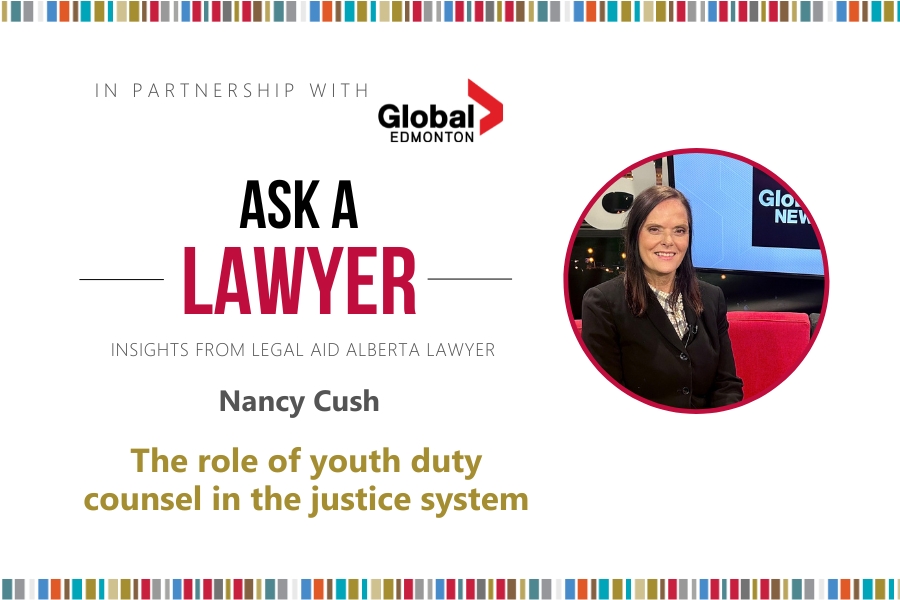The Youth Criminal Justice Act ensures that young people are treated fairly – and differently than adults – if they come into conflict with the law and face criminal charges.
Legal Aid Alberta staff lawyer Nancy Cush, who has more than 25 years of experience in this area of law, appeared on the Global Morning News Ask A Lawyer segment to talk about how youth duty counsel lawyers help young people in court.
View the segment here – transcript below:
Transcript:
Erin Chalmers: The justice system can be confusing to navigate – for anyone. And this can be especially true for you to have been charged with a crime or are having their very first experience with the courts. Here to talk about youth and duty counsel lawyers and their role in the justice system is Legal Aid Alberta staff lawyer Nancy Cush – is it Cush?
Nancy Cush: Yes.
Chalmers: OK good. Thank you so much for here this morning. So first of all, let’s just talk about the role of a youth duty counsel lawyer.
Cush: Youth duty counsel lawyers are in what’s known as youth criminal docket court and essentially, they’re the first hopefully friendly face that a young person sees when they come before the court, whether they’re in jail or out of jail. And we’re trying to help them through the process, which must be very stressful.
Chalmers: For sure. Now what kind of age range are we looking at here?
Cush: We’re looking at 12 to 18-year-olds who can be charged. When the allegation of a criminal offense occurs, they come before the docket court.
Chalmers: And what’s the difference between a youth criminal docket court and an adult one – besides the age, obviously?
Cush: Well, they’re held to a very different standard in these criminal docket court. We have a regime called the Youth Criminal Justice Act and Section 3 of that regime says that young persons must be dealt with differently than adults. And accordingly we – basically, they’re held to a lesser standard in law for the consequences for their behaviour, because they are youth.
Chalmers: Right – they’re still learning, a lot of them.
Cush: Exactly.
Chalmers: So as a youth duty counsel lawyer can you handle a case from start to finish? Do you stay with these youth the whole time?
Cush: Yes. For many cases when there’s a resolution that involves either a guilty plea or perhaps we get the charges dropped for the young person, then we can take the case from start to finish. But for the highly complex cases which take a lot more than a couple of docket appearances we can get them appointed a lawyer through what’s called the criminal trial group at our legal aid office, or they are given to a lawyer, farmed out to a lawyer at a law firm that specializes in youth criminal law.
Chalmers: OK because I would imagine especially for a youth you would prefer to stay with one person throughout the process.
Cush: Yes. So, if it’s for resolution then we would do that but if it’s a trial then they have to have the Criminal Trial Group (at Legal Aid Alberta) or a lawyer at a law firm because we don’t handle trials and they have a right to a trial and a right to be presumed innocent until proven guilty beyond a reasonable doubt. So, just like an adult accused, we would make sure they have that part.
Chalmers: Yes. What are some of the ultimate takeaways that you want people to have when it comes to youth duty counsel lawyers? What are some of the main things you want them to know about you and your job?
Cush: Basically that we’re dealing with a lot of issues when the young person come before the court. The young person is possibly unhoused and we are looking to find them a permanent housing or the young person is dealing with mental health or addictions and we’re trying to get them treatment or assessment and treatment and counseling and, in that vein, we have a lot of professionals that we work with and those professionals would be probation officers, social workers, youth workers that work from various different agencies and come to youth court, and Indigenous court workers that come to help our Indigenous youth. And basically, we’re trying to make sure that they don’t re-offend, and (we) put them on a better path and provide them the resources they need to get through this spot in their life.
Chalmers: And hopefully, as you said, not continue that path.
Cush: That’s correct. And I have seen a lot of success stories, so it does make my job really rewarding.
Chalmers: I would imagine so. How long have you been doing this for?
Cush: I call it a life sentence, in that I’ve done it over 25 years. I’ve done it for over 25 years so that is a life sentence in law.
Chalmers: So, a life sentence that you’re happy to have taken! Well I appreciate you coming on the show to chat about this – it is a very important topic.
Legal Aid Alberta lawyers specialize in family law, child welfare, domestic violence, immigration as well as youth and adult criminal defence. If you have a question for a lawyer you can send it to [email protected].


